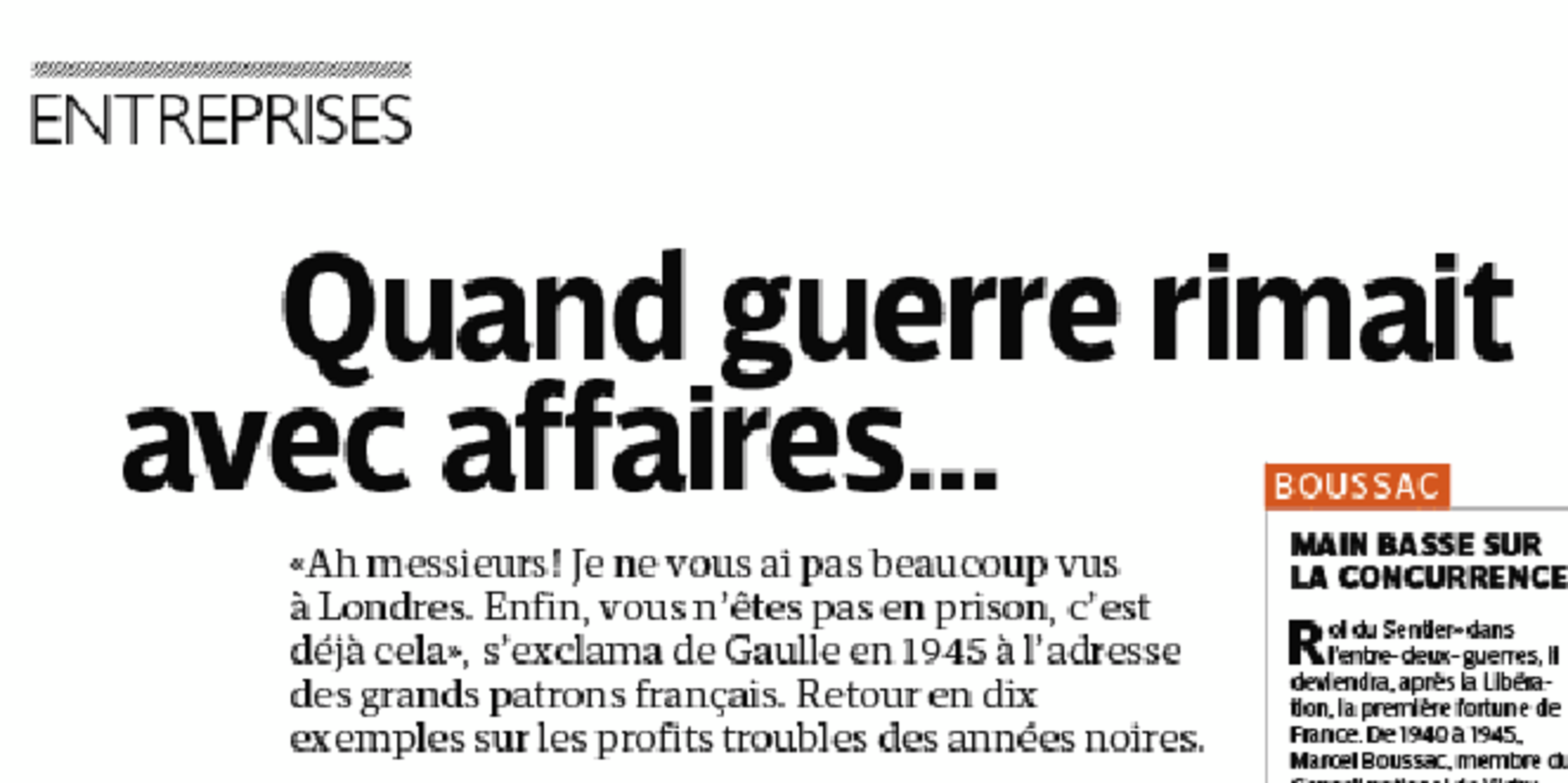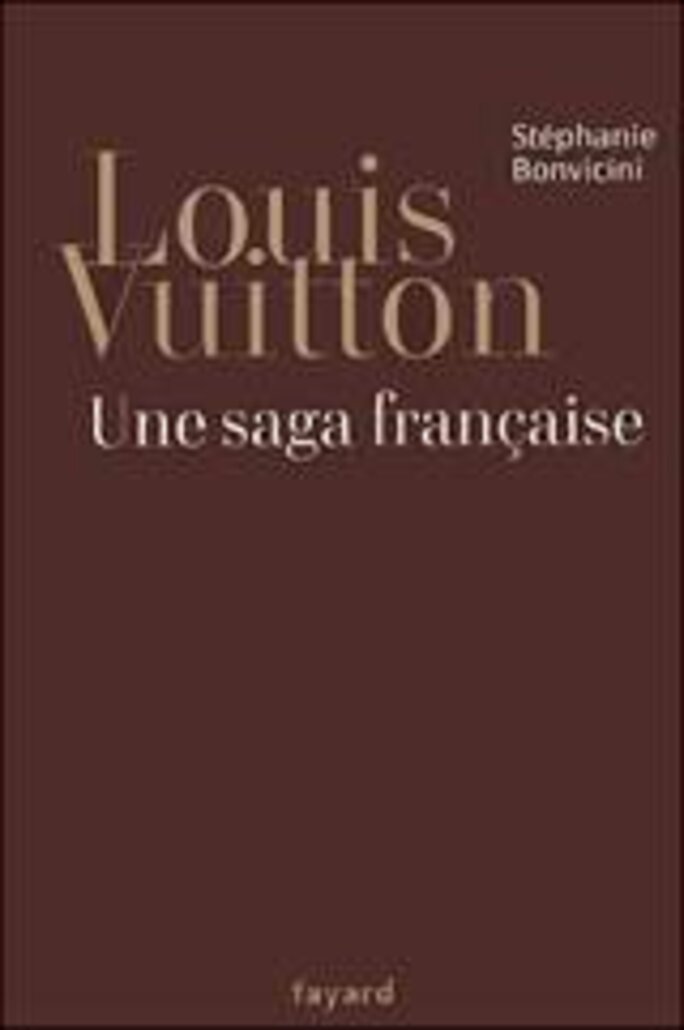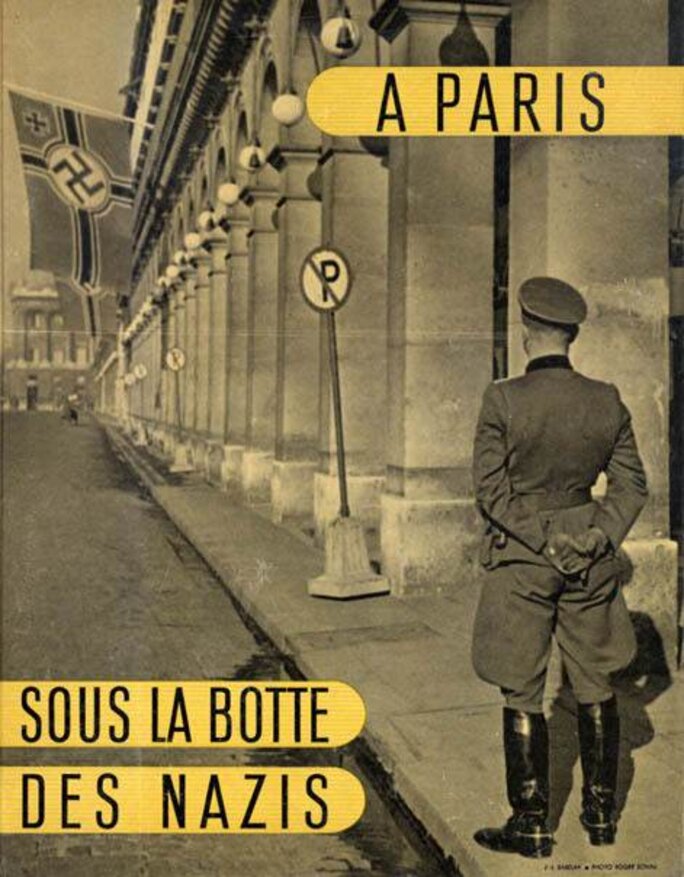A furious row has broken out at one of France's leading press groups, Prisma Presse, over the alleged censorship of an article detailing the unsavoury wartime collaborationist activities of several French businesses, notably Louis Vuitton, one of France's leading luxury goods firms. Representatives of Prisma's journalists, who claim the pages were censored for advertising reasons, say they will take the matter to the group's German owners, in a move that threatens to reopen yet more wounds from a clouded collaborationist past. Vincent Truffy reports.
-------------------------
There was some rare good news for the press industry earlier this month. The Prisma Presse group, bucking the trend in a sector blighted by shrinking sales and advertising, posted a 2% increase in its turnover for the first half of 2011.
Prisma's chairman, Rolf Heinz, partly explained the upturn as the result of the expanded offer of the group's titles, including the development of the monthly Geo magazine into three separate, thematic editions; Geo Histoire, Geo Voyage and Geo Savoir. "Each month, Geo sells more than 400,000 copies under its brand," he announced.

Enlargement : Illustration 1

Just a few days earlier, the latest issue of Geo Histoire magazine, a monthly publication about historical events, had hit the newsstands, with an edition dedicated to the subject of ‘France under the Occupation'. Its deputy Editor-in-Chief, Sylvie Bommel, wrote an interesting comment in her editorial. "Sometimes the smaller story, that which is centred on anecdotes about daily life, is placed against the big one, that with a capital H. What is fascinating about the occupation is that it is the small [story] that recounts the big one," she commented.
The magazine appeared on September 7th with five fewer pages of text than were originally prepared for this comprehensive account of life in France under the 1940-1944 German occupation. The amputated pages were on the subject of economic collaboration between French companies and businessmen and the Nazi occupiers and their puppet government set up in Vichy. The missing text was replaced with pages of an album of photos by Roger Schall of "France under the Nazi boot".
The cut was no ‘small story' for the magazine's journalists who wrote on September 8th to Bommel and Editor-in-Chief Eric Meyer expressing their alarm at an "act of censorship" (see document reproduced below).
"To stop the publication of an article on the ‘economic collaboration' (removed by the editorial management even though it had, in the first instance, validated and congratulated it) on the basis that one of the entrepreneurs cited (Vuitton) is a potential advertiser for the magazine or those of the Prisma Presse group, appears to us to be a serious attack on the conception we have of our profession and its deontology," wrote the journalists in a letter representing all of the Geo magazines' editorial staff.
Carrying a heavy wartime baggage
In the pages that were published, the magazine made no concessions to any political taboo; it denounced the actions of the French police under the occupation, describing them as a "precious ally of the 3rd Reich", and raised the thorny issue of collaboration among the public, copiously reproducing extracts of what it estimated to have been between "200,000 to 500,000 letters of denunciation" sent to the authorities under the French puppet regime of Marshal Philippe Pétain.

Enlargement : Illustration 3

But, some 70 years after the events, the scissors of censorship at Geo targeted a damning account of ten examples of the vile behavior of some of France's leading businessmen and businesses seeking to profit from one of the country's darkest periods.
Mediapart has seen the cut pages (pictured right). Titled "When war rimed with business", they began with a quote from General Charles de Gaulle, leader of the Free French Forces in London during the occupation, and who became French President after France was liberated in 1944. Addressing the country's leading businessmen at a meeting in 1945, when many wartime collaborationists had been summarily executed or were arrested and awaiting trial, he dryly told them: "Ah gentlemen, I didn't see much of you in London. Well, you're not in prison, that's already something."
Among the examples cited was that of the late Marcel Boussac, once owner of the Dior fashion house and who made a fortune in the textile business, emerging from WWII as the wealthiest person in liberated France. Under the occupation, Boussac had denounced a competitor company, Schwob, to the German authorities describing it as "a Jewish organisation [...] that represents an element of permanent upset for the entire market". The article also mentioned how the French bank Société Générale was "active in the redistribution of confiscated Jewish assets". The article reported how the bank's then-chairman, Henry Ardant, envisaged a "financial collaboration" with the Germans, with the creation of a European single currency.
There was the example of the now popular Radio Monte Carlo, created in 1942, which was taken over by the Vichy government's leader Pierre Laval to serve as "a radio for the new Europe", referring to the fascist regimes set up by the Nazis. The article detailed how French truck-maker Berliet supplied vehicles for the German authorities, just like Renault, nationalized after the war, and how chemicals company Francolor produced some of the cyanide-based pesticide Zyklon B used for Germany's mass extermination gas chambers.

Then there was the case of Louis Vuitton, the luxury goods company founded in 1854, beginning with the production of travelling bags and trunks, and which now, as part of the LVMH group, offers a range of exclusive fashion accessories, from leatherwear to sunglasses. During the occupation, the company was based in the town of Vichy, in the Hotel du Parc building complex where Marshal Pétain resided, and from where jewelers Van Cleef & Arpels, and the carpet company Saada and Levy had been evicted. Another of Vuitton's neighbours was the Bureau of Documentation and Propaganda, and which placed an order with the company to provide 2,500 busts of Marshal Pétain.
Henry Vuitton, grandson of Louis, established "strong friendships with Gestapo officers" explained the article in Geo Histoire, to the point of becoming one of the very few French businessmen to be decorated by the Nazis in "a ceremony during which officers from the SS and the Wehrmacht wore uniforms designed by a tailor from Metzingen, a certain Hugo Boss".
The Geo article was no scoop. These events and many others were detailed in the 2004 book by Stéphanie Bonvicini entitled ‘Louis Vuitton; a French saga' (Louis Vuitton, une saga française). "Nobody is prepared to risk losing their advertising revenue," Bonvincini told The Guardian newspaper in an article following the book's publication. "But it's scandalous that everyone is just ignoring the book." As the British newspaper then noted, LVMH is one of the French press's biggest advertisers.
Too much collaboration - Ed
According to the September 8th letter of protest written by Geo's editorial staff, it was nevertheless because of the mention of Vuitton that the five pages were cut, after deputy Editor-in-Chief Sylvie Bommel received the "disapproval of the advertising department (to whom the copy was submitted) concerned about not irritating a client".

Enlargement : Illustration 5

Contacted by Mediapart, Bommel insisted that she had had no contact about the article with with the Prisma group's advertising department. She said the articles had been submitted to the group's legal department as part of "normal procedure" and which "confirmed the lack of legal solidity" of the pages in question. "There were lengthy extracts that had no sources," she added. "I didn't feel right about it." Bommel said she took the decision "alone, without the Editor-in-Chief" and after talks with the publisher. "It wasn't a special edition about the collaboration," she said, "but about France under the occupation, in all its aspects, Resistance like collaboration. When I received the articles, I found that globally we overdid collaboration, from the story about the Atlantic Wall, the letters of denunciation and that [economic collaboration]."
Geo staff representatives have decided to take the matter before the ethics committee of the group's German owners, Hamburg-based Gruner+Jahr, Europe's largest magazine publisher, which has a charter guaranteeing the "editorial independence" of its journalists. This states that "internally, we exercise no influence upon editorial contents and do not submit to external political or economic influences."
One of the Prisma journalists, speaking to Mediapart on the basis of confidentiality, suggested that the events at Geo were particularly sensitive given the controversy into which Gruner+Jahr's owner, German media giant Bertelsmann AG, found itself in in 2002. US-based Israeli historian Saul Friedländer had revealed Bertelsmann's enrichment under the Nazi's, including through the publication of propaganda, and the company was forced to present public excuses for its conduct.
In 1998, Friedländer was mandated by then-Bertelsmann chairman Thomas Middelhoff to head a commission of historians to investigate and report on the company's activities under the Nazis (see their findings below).The move came after Bertelsmann's acquisition of US publishing company Random House, when Middelhoff's claim that his company was "one of the few non-Jewish media companies closed down by the Nazi regime" was sharply challenged. Called the Independent Historical Commission for Investigating the History of the Bertelsmann Firm during the Third Reich (IHC), the panel of historians demolished a number of false legends, notably that Bertelsmann had been closed by the Nazis due to its subversive publications, when in fact this was due to wartime supply shortages.
Indeed, in 1934, the company had met with great success with the publication of Flieger am Feind, a Christmas book for the Hitler youth movement aligning Christianity with Nazism. In fact, the commission found, Bertelsmann profited considerably from becoming publisher for the Wehrmacht (20 million publications in 1944) and had "indirectly" benefited from the forced labour of Dutch deportees in Germany, and Jews in Lithuania and Latvia. The company's chairman at the time, Heinrich Mohn, leant support and had close connections to the SS, and one of his daughter's was a member of the Nazi party.


